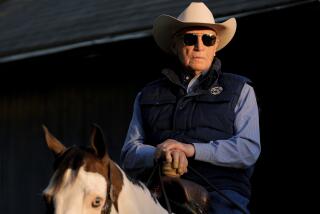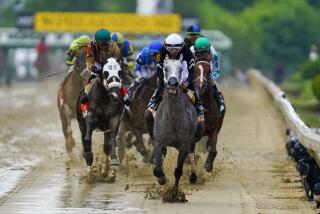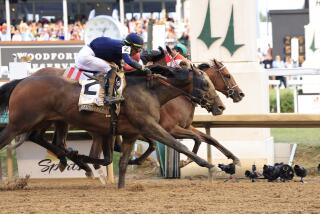When One Teardrop Is a Torrent of Hope : Horse racing: As trainer Jeff Lukas remains in a coma, his family cherishes each sign of possible recovery.
- Share via
The ward is so quiet when Wayne Lukas gets there. Beeps from a few monitors. Pulses from a few phones. The nurses all know him, and by now he knows all of them.
Karen, on day duty. Kelly, on nights. Rendy, who called four times on Christmas Day to inquire how he was doing. They and the others, pulling 12-hour shifts. Sticking around afterward, simply to see if there was anything else they could do. Handing manuals on brain trauma to Wayne, so he could study up on the fate that had befallen his son. So he could understand what the monitors meant. So he could read the vital signs.
The nurses. They took Brady Wayne Lukas, age 3 1/2, by the hand and led him into an anteroom of the Huntington Memorial Hospital to help him understand. Brady had been wondering why his daddy hadn’t been home.
Jeff Lukas had always set aside one hour per night to read bedside stories to his boy. Ten days before Christmas, Brady’s daddy did not come home. He was knocked down by a horse. He was knocked unconscious. He had lapsed into a coma and his condition was grave. Wayne Lukas had witnessed what had happened to his son, before disbelieving eyes. Now his grandson wanted some answers.
“Where’s my dad?” he asked.
So, they took Brady to the hospital.
He entered the room and saw his father on the bed, sleeping the deepest sleep.
“Wake him up,” Brady said.
Wayne Lukas bent to touch his hand and said: “I would love to wake him up.”
No one could. Jeff would only awaken on his own. Long days and longer nights would pass before there was even a glimmer of life. The stillness continued. The cerebral pressure fluctuated. He lost 39 pounds, unable to take nutrition even intravenously. And then, a flicker of movement. A blink. A hint of comprehension.
Jeff’s wife, Linda, squeezed his hand. His father, Wayne, whispered into his ear. He read the daily sports page to his son. He told of the phone calls, the faxes, the letters. One from Gerald Ford. One from George Steinbrenner. Bob Knight, checking in daily. Then that uplifting moment came, when Jeff moved his hand. Not much, but he moved it.
The nurses. They took Brady Lukas to a room occupied by a mannequin. Tubes protruded from it, every which way. Wires were tethered to it, machines connected to it. They explained how oxygen is supplied to the human brain. They showed the boy a syringe, and how one works. They let him examine the model, explore it, ask questions. He asked what “head injury” meant. Brady is a sharp boy. He listens. He learns.
He returned to his father’s room.
“Are you taking good care of my dad?” Brady asked.
Yes, they said.
“He has a head injury,” Brady said.
Yes, they said.
“OK,” Brady said.
And he began making tapes. At home, Brady spoke into a hand-held recorder, making conversation with his father. Now he would tell him bedtime stories. Day by day, he would fill up the tapes. He or his mother or grandfather would go to the hospital. One of them would press the recorder to Jeff Lukas’ ear. They would never be sure how much he would hear. All they could do was check for a response. For life.
Christmas Eve came. The holidays had been all but forgotten. Wayne Lukas had tried to go about his business, training horses at Santa Anita, but the distraction made it difficult. Out the threshold of Barn 66, he had a clear view of the washing stall where Tabasco Cat, a magnificent horse, a potential Kentucky Derby horse, had broken free from his rein and gone galloping along the hardpan.
When Wayne Lukas heard the commotion outside his office around 8:30 on the morning of Dec. 15, he went outside in time to see his 36-year-old son stand in front of Tabasco Cat, trying to intercept the stampeding horse. Struck, he flipped into the air. Jeff’s skull struck the gravel.
Wayne rushed to his side. “Call for an ambulance!” he shouted, and an exercise girl did. Riders and grooms came running. Wayne felt his son’s forehead gently and spoke his name. There was no response.
The wait for the paramedics seemed endless, remembers Wayne, 58, one of the top trainers in the business. And then suddenly he had a vision, or at least what he thought was a vision. A woman in a crisp white dress. A nurse. What was she doing there so quickly, near the stables of a race track?
She turned out to be Denise Constantinide, not a nurse but a technician from the Dolly Green Nuclear Imaging Center, an equine facility on the Santa Anita grounds. She knelt and felt for a pulse. It was weak, but it was there.
It was some solace until the paramedics came. They prepared to take Jeff to a nearby clinic. No, an onlooker said, take him to Huntington, they have a trauma center there. Take him by helicopter. Wayne Lukas has this man’s name. He hopes to thank him properly some day. He hopes this man helped save his son’s life.
But first he must wait. The vigil continues. Wayne was so hopeful Thursday when he found out that Jeff had lifted his hand to his face. His condition had changed from critical to serious. But any emergency was possible. The brain pressure had risen dramatically when he was moved to another room for a CAT scan.
“Another day we finally had the cerebral pressure in check and then the pneumonia hit us,” Wayne says, making his daily call to his son’s side Friday. “Jeff’s temperature shot up to 104. But today things look better. The scans look excellent. The nurses taught me how to read the scans. The scans look excellent today.”
He is unnerved. He tries to work.
“It’s probably therapeutic for me to talk about it,” Wayne says later, in his office. The private phone number to Jeff’s room is pinned to a bulletin board above him. He has horses running, horses he and Jeff have trained. He will go back to the hospital soon and read today’s news to him. In the news this day, he sees that Virginia Kelley, the mother of President Clinton, has died of cancer at 70.
“I was in Arkansas with her, at the races,” Wayne says. “When I was about to leave, she said: ‘Would you write on my program for me? Write something to Bill so that he’ll know you and I spoke.’ I’ve got Bill Clinton in a couple of my win pictures from races in Arkansas.
“So, I took her program and wrote: Dear Bill: In thoroughbred racing, 85% of the production comes from the dam. So everything you have, remember, you owe 85% of it to your mother. I’ll bet he got a kick out of that.”
The phone rings.
“Denny Crum! Hi, coach, how you doin’?” Wayne says. He chats with the Louisville basketball coach awhile. Wayne once coached basketball. Bob Knight is as close a friend as he has. But so many have called. He gabs animatedly with Crum about horses and about his alma mater, Wisconsin, winning the Rose Bowl and then in hushed tones about Jeff, and thanks him for calling, hangs up and says: “Half the basketball coaches in the country must have called by now. These guys keep me sane.”
It is not easy to behave normally. Everyone so wanted to make Christmas as normal as possible for Brady, for the brave boy who sat there making tapes. Brady turned off the recorder and wrote his letter to Santa Claus. He placed it next to a plate of cookies.
Dear Santa,
The cookies are for you.
Please leave one present for my Dad.
Brady Lukas
Christmas morning, Brady found his own present, an electric go-kart. He went for a ride. There is a fountain at the end of the street near his house. Brady drove the little car that far. Then he made another tape for his father.
The tape was taken to the hospital. It was pressed next to Jeff Lukas’ ear. His son’s voice said: “Dad. I rode my go-kart down to the fountain today. Dad, I wore my helmet. No head injuries!”
A teardrop ran down Jeff Lukas’ cheek.
He had heard.
More to Read
Go beyond the scoreboard
Get the latest on L.A.'s teams in the daily Sports Report newsletter.
You may occasionally receive promotional content from the Los Angeles Times.










